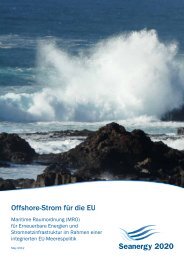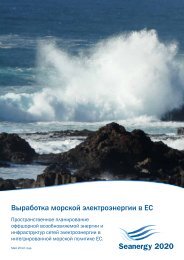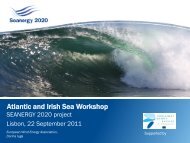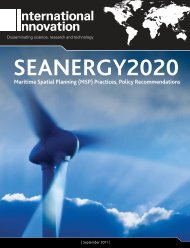Comparative analysis of Maritime Spatial Planning ... - Seanergy 2020
Comparative analysis of Maritime Spatial Planning ... - Seanergy 2020
Comparative analysis of Maritime Spatial Planning ... - Seanergy 2020
Create successful ePaper yourself
Turn your PDF publications into a flip-book with our unique Google optimized e-Paper software.
and the Atlantic Sea) there is an integrated GIS system that has been complied by The Crown Estate andavailable to wind farm developers but this is not publically available. Progress in Denmark is moremeasured as although there are significant efforts through the National Survey and Cadastre (including itsresponsibility by law to implement the INSPIRE Directive) there are still a number <strong>of</strong> different maritime datasets that have not yet been integrated into a single GIS system.By comparison countries bordering the Baltic Sea appear to have made less progress in relation to dataand information management, with the exception <strong>of</strong> Lithuania where there are current effort to integratedifferent data sets into a single GIS system, although this is being coordinated at an EU level through theBaltSeaPlan rather than at the national level. Other Baltic Sea countries are characterized by theavailability <strong>of</strong> some information but with gaps and also by a lack <strong>of</strong> coordination or integration into a singleGIS system. For example, although there are a number <strong>of</strong> different data sets in Finland the quality <strong>of</strong> thedata for MSP uses has been questioned (Iuga, 2010); data and information in Poland was described as„rather patchy‟ (Blažauskas & Suzdalevand, 2011); and in Estonia there is a lack <strong>of</strong> data coverage withinthe EEZ. There are no integrated GIS systems for these countries or for Latvia or Sweden. In constrats,there are current efforts in Lithuania to integrate different datasets into a single GIS system through aninitiative coordinated at the EU level, through the BaltSeaPlan Project 9 .Progress in countries bordering the Atlantic Coast and Irish Sea is mixed. Both UK and Portugal have madesignificant progress with integrated systems, while data and information management in other countries(Spain, Ireland, France) appears to be more sectoral with more limited integration. Although data is notfully comprehensive in Portugal there are efforts underway to extend the data coverage and integrate datainto a single GIS system and much <strong>of</strong> the data is publically available within a WebGIS interface. In the UKthere is extensive environmental data and some socio-economic data integrated into a single GIS systemknown as the Marine Resource System (MaRS), although as mentioned above this data is run by the CrownEstate, and the main problem seems to be the lack <strong>of</strong> access to this data. Both France and Spain haveextensive datasets but these are not always available in GIS although there have been significantimprovements in France recently in this respect. Ireland‟s data sets also appear to be sectoral and lackingin socio-economic data.The Mediterranean region has made some progress in terms <strong>of</strong> data and information management. Spainand France have been mentioned above and both collect a range <strong>of</strong> data although not all <strong>of</strong> this isavailable in GIS format. In Greece and Italy relevant data is also collected but is collected by a range <strong>of</strong>different institutions and in different formats making it difficult to integrate and use for maritime planningpurposes. However, there has been an effort in Greece recently by the Centre for Energy Resources andSaving (CRES) to collect all relevant data for MSP and this should improve further with the establishment <strong>of</strong>an independent authority for O-RE.9 For more information, please check the BaltSeaProject initiatives at http://www.baltseaplan.eu/Deliverable 2.313 | P a g e






